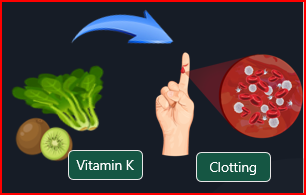Like vitamin D, vitamin K can be obtained from a nonfood source. The “K” is derived from the German word “koagulation”, refers to blood clotting. Bacteria in the GI tract synthesize vitamin K that the body can absorb. Vitamin K is most well-known for its role in blood clotting, where its presence can mean the difference between life and death. Blood has a remarkable ability to remain liquid, but it can turn solid within seconds when the integrity of that system is disturbed. (If blood would not clot, a single pinprick might deplete the entire body’s blood supply.)
The Science Behind Vitamin k
There are two naturally occurring forms of vitamin K: phylloquinone (K1) and menaquinones (K2).
Phylloquinone
Plants synthesize phylloquinone, which is the most common form of vitamin K and is found in leafy green vegetables.
Menaquinone
Menaquinone is produced by the bacteria in the gut and are found in animal foods, such as meat, eggs, and dairy products, as well as in fermented foods, such as natto and sauerkraut.
Role of vitamin K in the body
Vitamin K and Blood Clotting

Vitamin K involves a group of compounds that are required for the synthesis of prothrombin and other blood clotting factors. Blood will not coagulate properly without vitamin K.
Vitamin K is crucial for the production of several proteins that play a key role in blood clotting. These proteins help wounds heal and prevent excessive bleeding. It is a cofactor for the production of prothrombin and other clotting factors. Prothrombin is a protein that is converted to thrombin, the enzyme that cuts fibrinogen to form fibrin clots. Fibrin clots seal off blood vessels to prevent bleeding.
Vitamin K and Bone Health
Vitamin K is not only a nutrient but it is also your bone’s best friend. The simple truth of how it keeps your bones healthy and strong is as follows:
Calcium Regulation: Vitamin K takes charge of calcium, the bone’s building block. It ensures calcium behaves properly by activating a special protein called osteocalcin. This protein is like the glue that binds calcium to your bone’s structure, making them sturdier and tougher.
Crucial for Bone Health: Vitamin K doesn’t stop at calcium regulation; it also plays a starring role in bone health. It acts as a helper, or “cofactor,” for the production of osteocalcin. This protein is the bridge that helps calcium become an integral part of your bones.
Vitamin K and Cardiovascular Health
Calcification Fighter: Vitamin K is essential in lowering the risk of vascular calcification. In short, it helps in the prevention of harmful calcium accumulation in your arteries, which can lead to major cardiac issues.
Plaque Buster: But that’s not all; vitamin K also comes to the rescue by helping to prevent the formation of artery-clogging plaques. This action is a significant defense move, as it lowers your chances of developing heart disease and suffering from strokes – two major threats to a healthy heart.
Vitamin K deficiency
Vitamin K is important nutrient for blood clotting. Lack of vitamin K could lead to some major health problems.
Symptoms of vitamin K deficiency can include:
- Easy bruising and bleeding
- Nosebleeds
- Heavy menstrual bleeding
- Blood in the stool or urine
A primary vitamin K deficit is uncommon; however a subsequent deficiency can emerge in two situations. First, when fat absorption is impaired, such as when bile synthesis is impaired.
Vitamin K Sources
Leafy green vegetables are the best sources. Other good sources include:

- Broccoli
- Brussels sprouts
- Cabbage
- Cauliflower
- Collard greens
- Kale
- Mustard greens
- Spinach
- Swiss chard
- Turnip greens
- Natto
- Sauerkraut
- Beef liver
- Eggs
- Fish
Vitamin K for Kids: Ensuring Healthy Growth
Vitamin K is an important for the development and growth of children, especially in term of bone health. Making sure kids consume enough vitamin K through their food is essential. The recommended daily intake of vitamin K for children is:
| Group | Age | Females (mcg/day) | Males (mcg/day) |
| Infants | 0-6 months | 2.0 | 2.0 |
| Infants | 7-12 months | 2.5 | 2.5 |
| Children | 1-3 years | 30 | 30 |
| Children | 4-8 years | 55 | 55 |
| Children | 9-13 years | 60 | 60 |
| Adolescents | 14-18 years | 75 | 75 |
Mostly children fulfill their vitamin need from the diet but children with medical history such as cystic fibrosis or malabsorption disorder have to take vitamin K supplements to meet their desire requirements.
Recommended Daily Intake and Dosage for Adults
The recommended daily intake of vitamin K varies by age and sex, but generally ranges from 90 to 120 micrograms (mcg) for adults
The recommended daily intake of vitamin K for adults:
| Group | Age | Females (mcg/day) | Males (mcg/day) |
| Adolescents | 14-18 years | 75 | 75 |
| Adults | 19 years and older | 90 | 120 |
| Pregnancy Breast feeding | – – | 75 75 | – – |
Vitamin K Toxicity
Vitamin K toxicity is very rare. It can occur in people who take high doses of vitamin K supplements. Symptoms of vitamin K toxicity can include:
- Headache
- Dizziness
- Nausea
- Vomiting
- Diarrhea
- Abdominal pain
Top 10 Vitamin K Rich Foods for a Balanced Diet
The top 10 foods high in vitamin K to include in your diet are listed below:
Kale: A nutrient powerhouse with high vitamin K1 content.
Spinach: Packed with vitamin K1 and a variety of other essential nutrients.
Collard Greens: Rich in both vitamin K1 and K2.
Broccoli: A versatile vegetable with a good dose of vitamin K1.
Brussels Sprouts: Delivering vitamin K1 along with fiber and antioxidants.
Natto: An excellent source of vitamin K2.
Liver: Provides vitamin K2, as well as essential nutrients like iron.
Eggs: Contain vitamin K2 in the yolk.
Prunes: A surprising source of vitamin K1.
Cabbage: Contains vitamin K1 and can be used in various dishes.
Here are some suggestions for increasing your intake of vitamin K:
- For lunch or supper, provide a side salad with leafy greens.
- Blend leafy greens, strawberries, and yogurt in a smoothie.
- In the morning, add leafy greens to your eggs.
- Leafy greens can be used to stews and soups.
- Wrap sandwiches or burritos with leafy leaves.
- Snack on raw veggies including broccoli, kale, and spinach.
You may simply raise your vitamin K consumption and enhance your general health by using these suggestions.
Conclusion
Vitamin K may not be in the spotlight like other vitamins, but its significance in our overall health cannot be underestimated. From blood clotting to bone health and cardiovascular protection, it plays a vital role.
